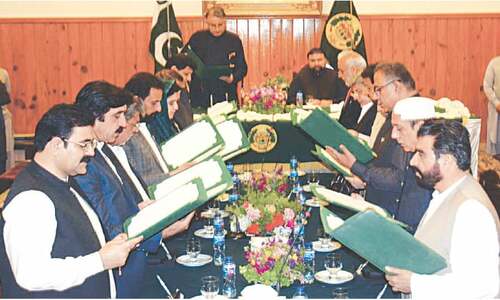ISLAMABAD, March 13: The Women Health Project (WHP) of the health ministry is forging partnerships with the civil society organizations to provide better health services to poor women in the far-flung areas.
The project director of the Women Health Project, Ms Shaheen Masood, said this while speaking at a function organised by the Catholic Relief Services (CRS) here to mark the International Women Day.
She said the WFP was working to provide better health facilities to poor women in 20 districts in the far-flung rural areas. However, she said the government could not achieve the targets alone.
"We are seeking communities participation in our efforts. The government believes in public-private partnerships that could play a meaningful role to bring about a positive change towards social and economic empowerment of the rural women, and a meaningful role in healthy and prosperous families in our society," Ms Masud said.
She said so far 8,000 lady health workers (LHWs) had been trained under the WHP in the identified less-privileged project areas in terms of health infrastructure and services in collaboration with the non-governmental sector.
"The $75 million WHP is also focusing on capacity-building and health education initiatives in close association with non- governmental organizations including Strengthening Participatory Organisation (SPO) and Save the Children," Ms Masood said.
She appreciated the role of the CRS in establishing NGO Resource Centre at the health ministry to bridge information gap and share knowledge base with other like-minded departments and NGOs, she said.
She said the project was also focusing on the management of district hospitals with the participation of local communities, and district governments, to provide 24-hour emergency services for mother-child care.
"We are putting in efforts to make these hospitals sustainable by providing equipment and fully trained staff so that they could be run efficiently when handed over to the district governments," Ms Masud.
Luc Picard, the country director of the CRS, briefed the meeting on their working in Pakistan for the last 50 years on a variety of issues including women empowerment, health awareness, HIV/AIDS, functional literacy, human and institutional development, micro-finance, and networking of NGOs. He said the women issues should be focused on all year round instead of celebrating just one day in a year.
Mr Picard especially mentioned about interactive theatre activities of the CRS, which helped them raise awareness about health and gender issues among the communities. He termed the community theatre a meaningful source to communicate sustainable development agenda.
Earlier, Fauzia Malik, the programme officer of Women Empowerment Programme for Peace (WEPP), a project of the CRS, made a detailed presentation on WEPP and its contribution in the development of socio-economic conditions of women in the project area.












































Dear visitor, the comments section is undergoing an overhaul and will return soon.